
Sea urchins are spiny, globular echinoderms in the class Echinoidea. About 950 species of sea urchin are distributed on the seabeds of every ocean and inhabit every depth zone from the intertidal seashore down to 5,000 meters. The spherical, hard shells (tests) of sea urchins are round and covered in spines. Most urchin spines range in length from 3 to 10 cm, with outliers such as the black sea urchin possessing spines as long as 30 cm (12 in). Sea urchins move slowly, crawling with tube feet, and also propel themselves with their spines. Although algae are the primary diet, sea urchins also eat slow-moving (sessile) animals. Predators that eat sea urchins include a wide variety of fish, starfish, crabs, marine mammals, and humans.

Arthur James Balfour, 1st Earl of Balfour,, also known as Lord Balfour, was a British statesman and Conservative politician who served as Prime Minister of the United Kingdom from 1902 to 1905. As foreign secretary in the Lloyd George ministry, he issued the Balfour Declaration of 1917 on behalf of the cabinet, which supported a "home for the Jewish people" in Palestine.
Champagne is a 1928 British silent comedy film directed by Alfred Hitchcock and starring Betty Balfour, Gordon Harker and Jean Bradin. The screenplay was based on an original story by writer and critic Walter C. Mycroft. The plot concerns a young woman forced to take a job after her father loses his fortune.
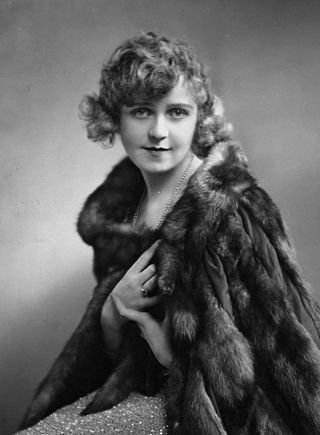
Betty Balfour was an English screen actress, popular during the silent era, and known as the "British Mary Pickford" and "Britain's Queen of Happiness". She was best known to audiences for her Squibs series of films.
Nothing Else Matters is a 1920 British film, written by Hugh E. Wright, and directed by George Pearson. This was the screen debut of Mabel Poulton and Betty Balfour who went on to become leading British stars of the 1920s.
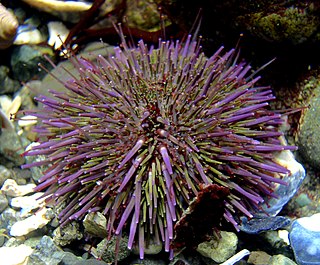
Strongylocentrotus purpuratus is a species of sea urchin in the family Strongylocentrotidae commonly known as the purple sea urchin. It lives along the eastern edge of the Pacific Ocean extending from Ensenada, Mexico, to British Columbia, Canada. This sea urchin species is deep purple in color, and lives in lower inter-tidal and nearshore sub-tidal communities. Its eggs are orange when secreted in water. January, February, and March function as the typical active reproductive months for the species. Sexual maturity is reached around two years. It normally grows to a diameter of about 10 cm (4 inches) and may live as long as 70 years.

George Hackathorne was an American actor of the silent era. He appeared in more than 50 films between 1916 and 1939.
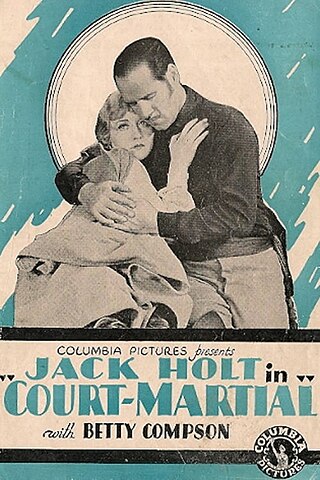
Court Martial is a 1928 American silent film war drama film directed by George B. Seitz, starring Jack Holt, Betty Compson as Belle Starr, and Frank Austin as Abraham Lincoln, and released by Columbia Pictures.
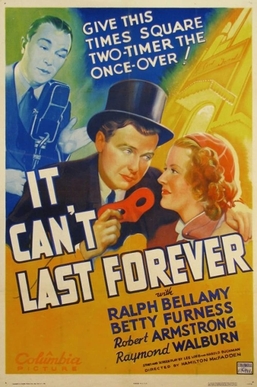
It Can't Last Forever is a 1937 American comedy film directed by Hamilton MacFadden and starring Ralph Bellamy, Betty Furness, and Robert Armstrong. It is also the debut film for an unbilled 11-year-old Donald O'Connor, who would later go on to be famous for his acrobatic tap dancing.
Squibs is a 1921 British silent comedy film directed by George Pearson and starring Betty Balfour, Hugh E. Wright and Fred Groves. It was followed by three sequels starting with Squibs Wins the Calcutta Sweep and a 1935 remake.
Cinders is a 1926 British silent comedy film directed by Louis Mercanton and starring Betty Balfour, Fred Wright and André Roanne. A servant in a London boarding house loses her job and accompanies one of the lodgers to his newly acquired casino on the French Riviera.
Squibs Wins the Calcutta Sweep is a 1922 British silent comedy film directed by George Pearson and starring Betty Balfour, Fred Groves and Hugh E. Wright. It was the sequel to the 1921 film Squibs.
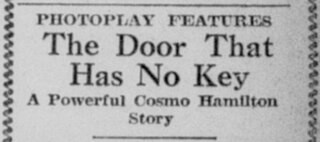
The Door That Has No Key is a 1921 silent British drama film directed by Frank Hall Crane. The film is considered to be lost.
Mary-Find-the-Gold is a 1921 British silent drama film directed by George Pearson and starring Betty Balfour, Tom Coventry and Hugh E. Wright.
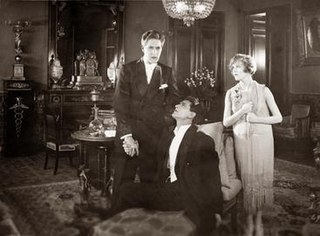
Monte Carlo is a 1925 French silent drama film directed by Louis Mercanton and starring Carlyle Blackwell, Betty Balfour and Rachel Devirys. The film is based on the novel Prodigals of Monte Carlo by E. Phillips Oppenheim. The casting of Blackwell and Balfour in leading roles was intended to give the film appeal in the British market.

Flaming Guns is a 1932 American Western film directed by Arthur Rosson and written by Jack Cunningham. The film stars Tom Mix, William Farnum, Ruth Hall, Clarence Wilson, George Hackathorne and Duke R. Lee. The film was released on December 22, 1932, by Universal Pictures. It was based on a story by Peter B. Kyne.
Squibs M.P. is a 1923 British silent comedy film directed by George Pearson and starring Betty Balfour, Hugh E. Wright and Fred Groves.
Squibs' Honeymoon is a 1923 British silent comedy film directed by George Pearson and starring Betty Balfour, Hugh E. Wright and Fred Groves. It was the last of the silent film series featuring the character, although Balfour returned to play her in the 1935 sound film Squibs. Both Pearson and Balfour were particular favourites of the British film critic, and later leading screenwriter, Roger Burford. In his first article for the magazine Close Up Burford would write "Not long ago a film of the Squibbs series was reported to be on at a small cinema in a slum district. It was a rare chance, and we went at once. We were not disappointed: the film was English, with proper tang; the tang of Fielding or Sterne.' Burford's comments help place the Squibbs films perfectly in British culture between the wars. They were very much working-class comedy, drawing on a vernacular, performative tradition, but at the same time their "Englishness" is characteristic of the kinds of satirical comedies found in the novels of Henry Fielding and Laurence Sterne. That earthy satire, based on everyday life, made these comedies unpalatable to middle class audiences but the Squibbs films were amongst the most interesting, and well shot, films in Britain in the 1920s.
The Maid at the Palace is a 1927 French silent film directed by Louis Mercanton and starring Betty Balfour, Lucy Sibley and Irene Tripod.

Beyond the Law is a 1930 American western film directed by J. P. McGowan and starring Robert Frazer, Lane Chandler and Louise Lorraine. It was one of the final productions of the independent Rayart Pictures, under the name Raytone Talking Pictures. The company was later revived as Monogram Pictures.










